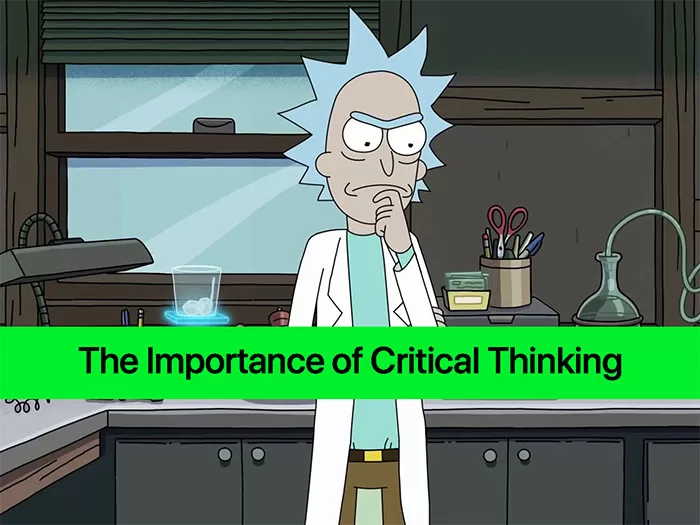In today’s world, it is more important than ever to be able to think critically. Critical thinking is the ability to think clearly and rationally, evaluating information and arguments in order to form a judgment.
It is a skill that can be learned and developed, and it is essential for success in many areas of life, including school, work, and personal relationships.
Table of Contents
Why is critical thinking important?
There are many reasons why critical thinking is important. Here are a few of the most important:
- Improved decision-making: Critical thinkers are better able to make informed decisions because they are able to gather information, weigh the pros and cons of different options, and identify potential risks.
- Increased problem-solving ability: Critical thinkers are better able to solve problems because they are able to identify the root of the problem, generate creative solutions, and evaluate the effectiveness of those solutions.
- Enhanced communication skills: Critical thinkers are better able to communicate their ideas clearly and persuasively, both orally and in writing. This can be helpful in both personal and professional settings.
- Increased self-awareness: Critical thinkers are better able to identify their own biases and limitations, which can help them to make better decisions and to communicate more effectively.
How to improve your critical thinking skills
There are many ways to improve your critical thinking skills. Here are a few tips:
- Ask questions: When you are presented with information, ask questions about the evidence, the reasoning, and the conclusions.
- Be open-minded: Be willing to consider different perspectives and to change your mind if the evidence warrants it.
- Be aware of your own biases: We all have biases, but it is important to be aware of them so that we can avoid letting them cloud our judgment.
- Practice: The more you practice critical thinking, the better you will become at it. So start practicing today!

Where can I learn more about critical thinking?
There are many resources available to help you learn more about critical thinking. Here are a few suggestions:
- Books: There are many books on critical thinking available, such as “Critical Thinking: A Survival Guide” by Richard Paul and Linda Elder.
- Articles: There are many articles on critical thinking available online, such as “The Importance of Critical Thinking” by the National Council of Teachers of English.
- Online courses: There are many online courses on critical thinking available, such as the “Critical Thinking” course offered by Coursera.
Conclusion
Critical thinking is an essential skill for success in today’s world. By learning to think critically, you can improve your decision-making, problem-solving, and communication skills.
You can also become more aware of your own biases and limitations, which can help you to make better decisions and to communicate more effectively.
So what are you waiting for? Start practicing your critical thinking skills today!
FAQs: Importance of Critical Thinking
Q1: What is critical thinking?
Critical thinking is the ability to analyze, evaluate, and synthesize information in a systematic and logical manner. It involves questioning assumptions, considering multiple perspectives, and making informed decisions.
Q2: Why is critical thinking important in everyday life?
Critical thinking is essential in everyday life as it helps individuals solve problems, make sound decisions, and navigate complex situations. It enables a more thoughtful approach to various aspects of life, fostering better choices and outcomes.
Q3: How does critical thinking benefit education?
Critical thinking enhances the learning process by encouraging students to explore concepts deeply, question information, and develop independent thoughts. It prepares them for academic success and equips them with valuable skills applicable to various subjects.
Q4: What role does critical thinking play in the workplace?
In the workplace, critical thinking is crucial for problem-solving, decision-making, and innovation. Employees who can think critically are better equipped to adapt to changes, address challenges, and contribute to the overall success of their organizations.
Q5: How does critical thinking contribute to effective communication?
Critical thinking improves communication by promoting clarity, coherence, and precision in expression. It enables individuals to articulate their ideas more effectively, listen attentively, and engage in meaningful and constructive dialogues.
Q6: Can critical thinking be developed and improved?
Yes, critical thinking is a skill that can be developed and enhanced over time. Engaging in activities such as problem-solving exercises, debates, and analyzing different perspectives can contribute to the improvement of critical thinking abilities.
Q7: How does critical thinking relate to decision-making?
Critical thinking is integral to decision-making as it involves evaluating options, considering potential outcomes, and choosing the most reasoned and informed course of action. It minimizes impulsive decisions and promotes better choices.
Q8: Why is critical thinking important in the era of information overload?
In the age of information overload, critical thinking is essential to sift through vast amounts of data, distinguish between credible and unreliable sources, and form well-founded opinions. It helps individuals navigate the complexities of the information landscape.
Q9: Can critical thinking be applied to ethical considerations?
Absolutely. Critical thinking plays a crucial role in ethical decision-making by encouraging individuals to assess the consequences of their actions, consider different moral perspectives, and make choices aligned with ethical principles.
Q10: How does critical thinking contribute to personal growth and development?
Critical thinking fosters personal growth by promoting self-reflection, adaptability, and a willingness to challenge one’s own beliefs. It encourages a continuous process of learning and adapting, contributing to overall personal development.


0 Comments